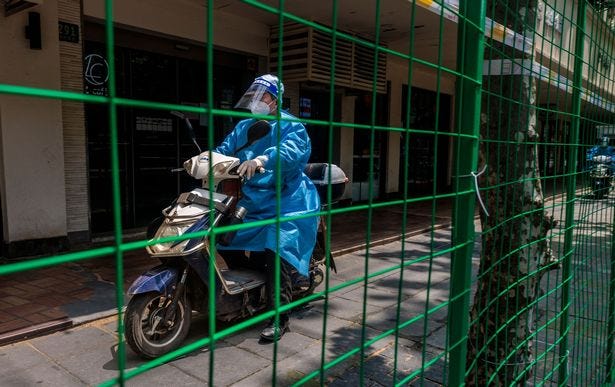Shanghai Cages Its Residents As COVID-19 Cases Spike Yet Again
Beijing Does The COVID-19 Game Of Whack-a-mole
The dystopian horror of Shanghai gets ever more surreal. In recent days, residents are literally being caged as green fencing has begun appearing around various homes. Those inside are trapped inside.
The extremely strict lockdown has already pushed Shanghai's citizens to their limits, as babies and young children have been separated from their parents under current rules.
And people are shocked by the latest initiative, which has seen two-metre-high, green fences put up to create 'sealed' areas around buildings where at least one person has tested positive for Covid.
It surprised residents, who had no idea about the new rule until they woke up to find the fences.
Meanwhile, the lockdown continues to be ineffective at stopping the virus, with cases rising by ~200 in the past 24 hours.
The financial hub reported 9,970 infections and 52 deaths for Thursday, slightly up from 9,764 cases on Wednesday. In addition, it also reclassified 5,062 previously counted asymptomatic patients as symptomatic, the highest such number in the past week.
In Beijing, Zero COVID is slowly devolving into the endless game of COVID-19 whack-a-mole the CCP has been trying to avoid.
Most people in the commercial hub were one month into stressful home isolation, struggling to meet basic needs. But there was hope on the horizon as the number of new cases declined further and officials said their focus was shifting towards boosting vaccinations among the elderly.
Fears were growing, however, that China would be trapped in a whack-a-mole game in coming months, lifting lockdowns in some places, while imposing others elsewhere, causing severe economic damage and exasperating its population.
Indeed, the situation in Beijing appears to be that of a creeping lockdown, as more and more restrictions are put in place, creating the same concerns of food delivery that have plagued Shanghai.
Additional apartment blocks were sealed and certain spas, KTV lounges, gyms, cinemas and libraries, and at least two shopping malls closed on Friday, while couriers and food delivery staff were refused entry to some residential compounds.
Companies such as JD.com, an e-commerce platform, have been striving to keep residents well supplied.
The head of one of its logistics centres on the outskirts of Beijing, 32-year-old Ming Tang, said delivery volumes have increased by 65% since the first cases emerged on April 22, and 80% of the parcels are food-related.
Despite the measures Beijing still recorded 49 cases on April 28, versus 50 the previous day—hardly a significant decline in cases.
Thus far, Zero COVID has had zero success.



